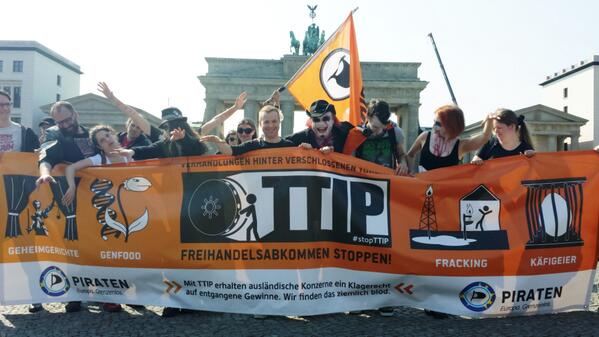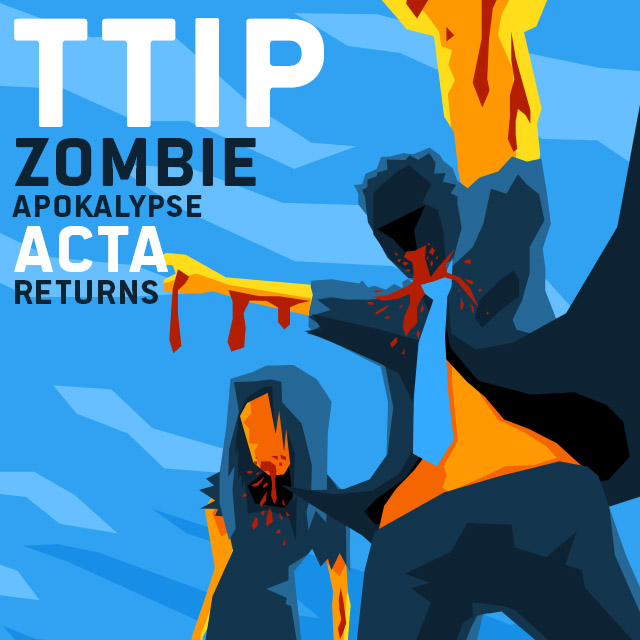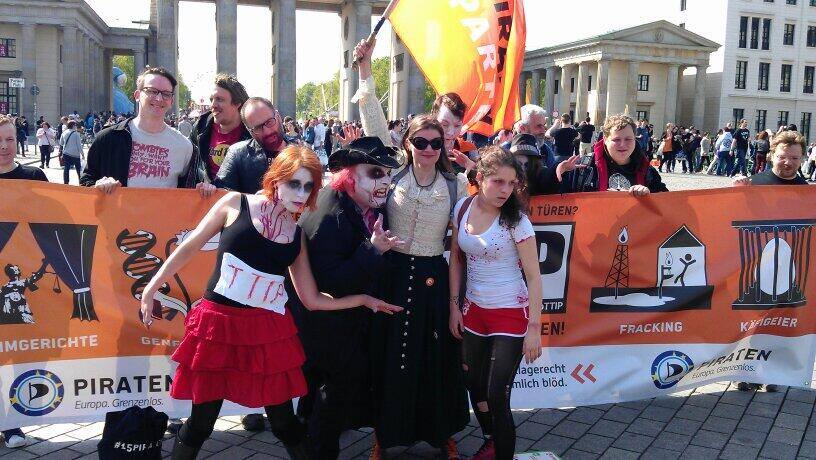Pirate party: Zombie walk against TTIP in Berlin

Revolution News 04/20/2014
Pirate Party: Zombie Walk against TTIP in Berlin
Many activists are moving to Berlin to create an alternative: this is the city where every day some demo is held, there is not that much police to spook people around and events sometimes resemble real renaissance carnival. German Pirate Party called for a Zombie Walk on Easter Saturday. Walk started at Parizer Platz and ended at the Brandenburg Gate.
German Pirate Party invited everyone (AUDIO) for a Zombie Walk to protest against the draft contract of the secretively crafted transatlantic trade agreement TTIP (Trans Atlantic Trade and Investment Partnership).
A zombie walk is an organized public gathering of people who dress up in zombie costumes. Participants usually meet in an urban center and make their way around the city streets and public spaces (or a series of taverns in the case of a zombie pub crawl) in an orderly fashion. Zombie walks can be organized simply for entertainment or with a purpose, such as setting a world record or promoting a charitable cause. Originating in North America, zombie walks have occurred throughout the world.
“ The ACTA zombie has been revived, he is stronger than ever. Like the ancient Hydra, everywhere where we cut it’s head, new heads have been grown, and their names are TTIP, CETA and TISA“, said Bruno Kramm, Pirate Party Deutschland. They held a demo on Easter Saturday under a specially designed banner at the Brandenburg Gate and the U.S. embassy.

For the Pirate Party TTIP is a “dystopian vision”. Particularly insidious is the concept of “living agreement”, thanks to whom everything must be checked in an early stage of any new legislative initiative.
”For us is a TTIP is ‘undead agreement’, a long-buried and now exhumed,” said Bruno Kramm who understands the Internet and the tradition of the Easter marches. So he said in a speech , the children of the 80′s peace movement, Perestroika and the fall would have discovered “their peaceful, comprehensive and boundless salvation for an equal cooperation in the network.”
Pirate Parties in Europe are actively working against TTIP and trying to enforce as much transparency in the negotiations as possible. The three top candidates of the Pirate Party published a confidential paper of negotiations on a free trade agreement between the EU and U.S.
Whether concessions on genetic engineering, data protection and environmental protection standards – the negotiations on the Free Trade Agreement Trans-Atlantic Trade and Investment Partnership (TTIP) are much criticized. One of the main criticisms: the negotiations were not transparent and were under the influence of big industry lobbyists.
Greens MEPs taken this criticism as an opportunity to have the EU Council guidelines for the negotiations on a own website online: ttip-leak.eu. The TTIP document marked as ’confidential’ is listed as well as requirements that have been made by the negotiating team of the EU Council.
“This mandate was adopted by the Council without the participation of the European Parliament and is still officially not open to the public,” criticized the Greens on the website.
EU trade policy sets the direction for trade and investment in and out of the EU.
The EU aims to play a key role in keeping markets open worldwide and helping Europe to exit from the economic crisis. EU trade policy is working to: create a global system for fair and open trade, open up markets with key partner countries, make sure others play by the rules and ensure trade is a force for sustainable development.
But this is not free trade. This is not merely the abolition of tariffs. It is the elevation of the principle of all-encompassing networks of regulation to ever more international and less accountable levels.
Pirates were working actively on the inside of the EU parliament and with the help of outside protests against ACTA (mainly in Poland) the EU parliament voted down the ACTA agreement in 2012. ACTA was a trade agreement which would have decreased freedom on the internet, given customs authorities snooping rights for hard drives / cell phones / memory sticks and giving the copyright industry more power in their crusade against file-sharers.
Images: Pirate Party Germany






